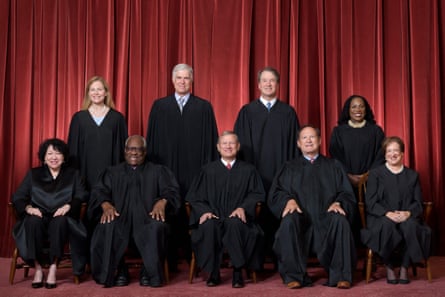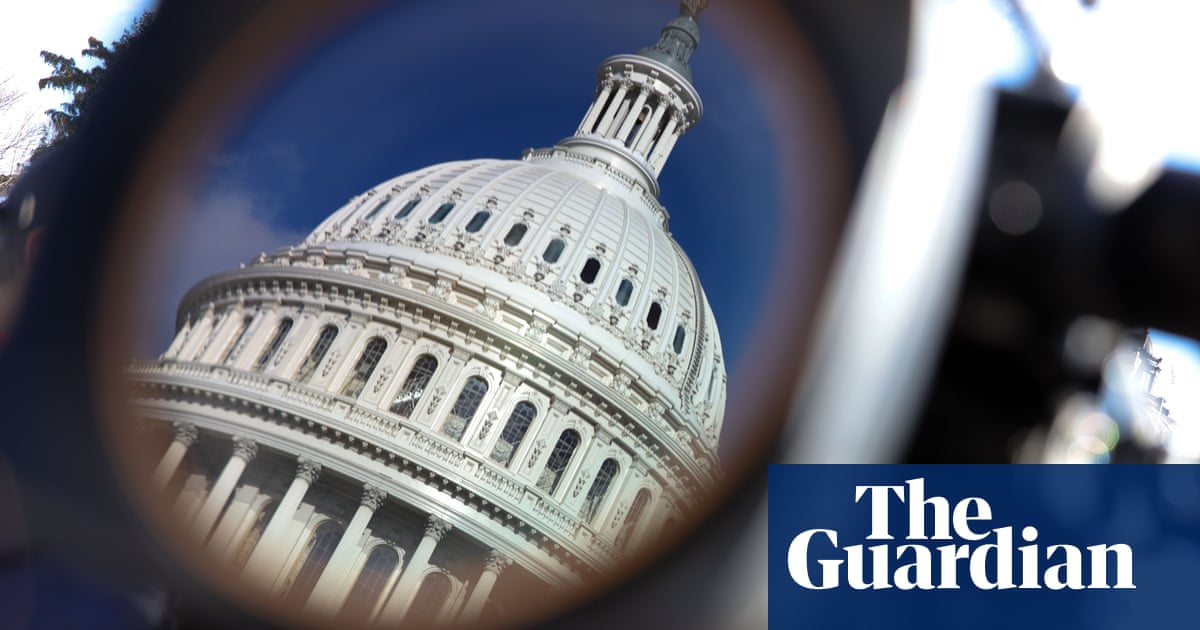Trump, emboldened by the immunity ruling, wants to strengthen his grip on the courts. ‘With a supreme court that has basically said Donald Trump can be a king, there will be no checks on him’

If Donald Trump re-enters the White House on 20 January he will do so emboldened by a power that no previous incoming president has ever enjoyed: immunity from criminal prosecution for any act carried out in his official capacity.
The protection, awarded in a July ruling from the far-right supermajority of the US supreme court, changes fundamentally the dynamics of the Oval Office.
“The justices wrote a how-to guide for a president who wants to break the law,” said Michael Waldman, president of the non-partisan Brennan Center for Justice. “In practical terms, if you are a president who wants to break the law, make sure your co-conspirators are also government employees – then you’re off the hook.”
The immunity ruling, in Trump v United States, is the clearest example yet of the judicial feedback loop that the former president established during his 2017 to 2021 presidency. With the active support of Republicans in the US Senate, then President Trump appointed three new hard-right justices to the country’s top court, creating a 6-3 conservative-to-liberal supermajority.

That super-majority duly repaid Trump. First it abolished the constitutional right to an abortion in Roe v Wade, and then it granted him substantial immunity from criminal charges.
The immunity ruling has had a direct bearing on the federal prosecutions against Trump brought by the special counsel Jack Smith. It could alter the parameters of a second Trump term, which he has already indicated will be devoted to retribution against his political enemies, mass deportations of undocumented immigrants, mobilization of the military against domestic targets, and other legally questionable moves.
A similar feedback loop is also operating in the lower courts. Take the US district judge whom Trump appointed in Florida, Aileen Cannon, who in July dismissed the criminal case against him for having hoarded classified documents at his Mar-a-Lago club. The judgment is being appealed.
At stake in this historically important election is whether Trump will be able to strengthen and deepen this feedback loop during a second term. And if so, how he would then deploy it.
The most obvious way to bolster an already powerful mechanism is to appoint more judges. Last time, Trump filled no fewer than 234 federal judicial seats.
That included three supreme court justices: Neil Gorsuch, Brett Kavanaugh and Amy Coney Barrett. He also placed 54 appeals court judges, the most powerful judges in the nation other than supreme court justices – just one fewer in four years than Barack Obama achieved over his entire eight years in office.
Top of Trump’s list of priorities will be to cement the far-right grip he has already secured on the supreme court. He could ensure the dominance of the supermajority for years to come if he could replace the older ultra-right justices, Clarence Thomas, who is 76, and Samuel Alito, 74, with similarly strident ideologues half their age.
Given their own fondness for the political values of the Make America Great Again movement, the two oldest justices may well be tempted to step down while Trump were in the White House to ensure continuity. Thomas, a rightwing stalwart, has already been on the top court for 33 years.
“The most likely retirement would be that of Justice Thomas,” said Steve Vladeck, a law professor at Georgetown University law center and an authority on the supreme court.

An even greater prize for Trump would be if one of the three liberal-leaning justices were forced to step down from her lifelong post. All eyes will be on the oldest of the trio, Sonia Sotomayor, 70.
Were Trump able to replace even one liberal justice, the supermajority would be boosted from its current dominant status to one that would be unassailable. A 7-to-2 balance would eradicate any ambiguity, remove any chance of compromise or moderation, and lock in a watertight far-right jurisprudence for at least a generation.
“If Donald Trump takes the White House and the Republicans control the Senate then it will be the next one, two, three justice appointments, and this will be our entire judiciary,” Elizabeth Warren, the senator from Massachusetts, told CBS News recently. “There will be no one to stop them, and with a supreme court that has basically said Donald Trump can be a king, there will be no checks on him.”
In the lower courts, Trump would also push to continue his remolding of the judiciary, both by aggressively pursuing new appointments to the federal bench and by championing judges who pay lip service to Maga values. If the Republicans regain control of the US Senate next week, there would be few impediments to him pursuing his goal.
“The extent to which the Senate had any kind of a backbone during the confirmation process for new judges during the Trump administration is likely to go away,” Vladeck said. “The constraints on Trump’s most extreme picks would vanish.”
A main target would be to push the powerful appeals courts further to the right. The New Orleans-based fifth circuit, the most hard-right appeals court in the country, already has six Trump appointees among its 17 active judges, and a second Trump term will aim to enhance that figure.
Waldman pointed out that the most ideologically driven judges appointed by Trump came towards the end of his presidency, indicating the increasingly radical direction in which he was moving. Those later appointments included Matthew Kacsmaryk, appointed as a federal district court judge in Texas in June 2019.
Some of the most controversial cases to reach the supreme court in recent months were initiated by Kacsmaryk in his northern district of Texas court. That included the ban on the abortion medication mifepristone (the supreme court restored access to the drug this summer).

Cannon, the judge who threw out the classified documents case, was also a late Trump appointment. She took up her federal position just two months before he left the White House.
Extreme judge appointments would be just one side of the coin. There are indications that Trump might go on the offensive in a second term to take on troublesome federal judges who put loyalty to constitution before loyalty to Trump.
One of the big frustrations of his four years in the White House was that federal judges repeatedly refused to allow him to act in unconstitutional ways. The courts blocked his initial Muslim travel ban, border asylum restrictions and attempt to allow healthcare discrimination against transgender patients, among many other actions.
In a second term, Trump is likely to toughen his approach. John Eastman, the lawyer who was central to the conspiracy to overturn the 2020 presidential election, has called for the removal of sitting judges. “We’ve got to start impeaching these judges for acting in such an unbelievably partisan way from the bench,” Eastman told a national conservative conference recently.
Waldman has detected another legal strategy that Trump could pursue in a second term as a way of bypassing constitutional objections to his most egregious policies. It is based on identifying relatively obscure federal statutes that were framed decades or even centuries ago and are written in such a loose way that they would give him substantial leeway.
Read more from the series
For instance, Trump has threatened to invoke the Insurrection Act, originally enacted in 1792, which would allow him to deploy the US military domestically against Americans. The law is so broadly cast that it gives a president wide powers to decide when it could be activated, and Waldman’s Brennan Center has called for the statute to be tightened up to prevent abuse.
At his Madison Square Garden rally last week, Trump also name-checked the 1798 Alien Enemies Act, a federal statute that was used to intern Japanese nationals in the second world war. The law, which allows citizens of foreign countries to be rounded up and removed in case of war, “invasion or predatory incursion”, could be used as legal justification for his plans to mass-deport millions of undocumented immigrants.
“Even a diligent judge would have a hard time imposing limits on some of these statutes that have very few guardrails and give presidents an awful lot of power,” Waldman said. “It turns out that it has been self-restraint, more than anything else, that has stopped these powers from being abused.”
Even Trump invoking vast powers vested in him by vague ancient laws pales beside Vladeck’s worst fear. What if Trump dares to flout the rule of law itself?
“My biggest concern is the very real specter that the courts rule against him, and he tells the courts to pound sand,” Vladeck said. “What if he tells his supporters that the supreme court justices are a bunch of Rinos [Republicans in name only] and tries to defy them? Who at that point will stand up for the courts?”

 German (DE)
German (DE)  English (US)
English (US)  Spanish (ES)
Spanish (ES)  French (FR)
French (FR)  Hindi (IN)
Hindi (IN)  Italian (IT)
Italian (IT)  Russian (RU)
Russian (RU)  3 weeks ago
3 weeks ago





















Comments